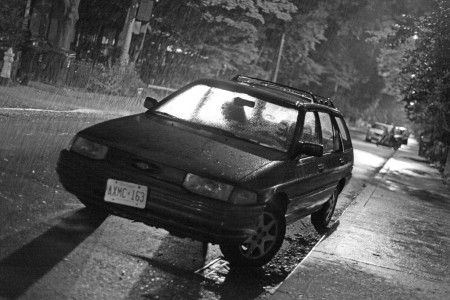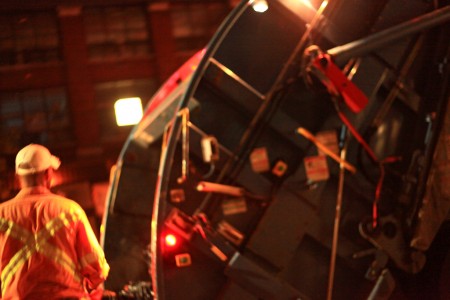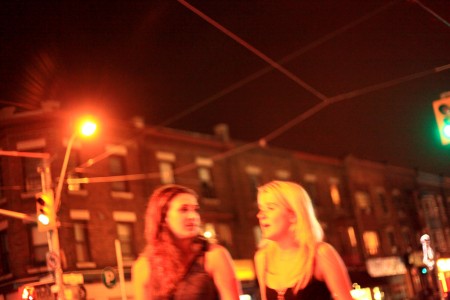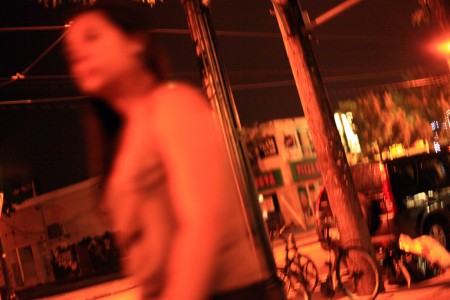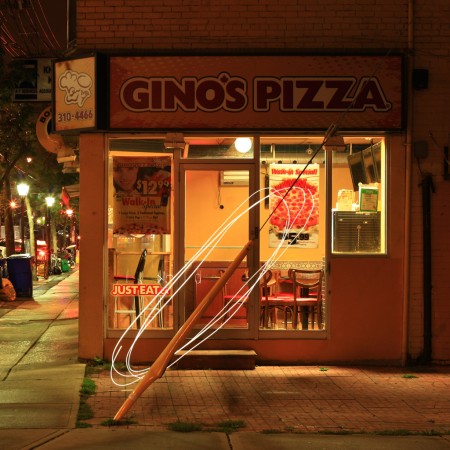Category: Toronto
First Massey photos
I have some preliminary photos taken around Massey College on Flickr. You can see them all at once now or watch them appear as photos of the day during the next while.
Massey College at the end of summer
Massey College is full of luxurious silence. At night, it is usually only possible to hear the water flowing into the pond in the main quad and the chirp of a few insects. The contrast with a room overlooking College Street is excessive, and the new transition has been a reminder of how important a home’s acoustic surroundings are for determining how pleasant or unpleasant it is to occupy.
We will see if the place becomes less tranquil as more of the junior fellows move in. For now, I am enjoying the ease with which I can pretend I am in rural Vermont, rather than the middle of Canada’s most sprawling metropolis.
It’s also remarkable to be living in a building designed by a single person (and a British Columbian) with the clear purpose of serving as a home for a group of young scholars. Some of this is revealed in tiny details, like how the desk chairs in the studies tuck elegantly against the side of the desk, or how the lamp behind the bed is designed to be easily turned on or off by a person reading. To get myself thinking about communal and intentional forms of living, I have been reading the Rule of Saint Benedict. It contains some good advice for people and communities in general, though I am glad not to be living in a place where supreme obedience to an abbot and scripture is a central part of life. Rather, the main aim will be to devote myself to scholarly work – research and writing.
Moving and course selection
I am moving into Massey College tomorrow, which is rather exciting.
On September 5th, I will be able to register for classes. I will be taking the core course for the PhD in either political theory (more likely) or Canadian politics (less likely). I will also be taking an environmental politics course, possibly a methods course, and taking a ‘Literature in our Time’ course for the sake of interest. I should be able to satisfy the PhD program’s language requirement using my undergraduate French classes at UBC.
I will also be working as a teaching assistant for an introduction to international relations course.
Classes begin on September 10th.
Recruiting for 350
Yesterday evening, I was out trying to collect email addresses for Toronto 350’s events email list.
I wasn’t being pushy – mostly just wandering around with a clipboard and a 350 t-shirt saying ‘good evening’ to people and then trying to engage the ones who responded in a discussion about climate change and the group. Over the course of two hours, I got 10 email addresses – one of them totally illegible. Many of the people who I spoke to yesterday declined to give me their email because they were already inundated with similar messages from other environmental groups. A few others explained that they didn’t see climate change as the environmental issue on which we should be concentrating our attention.
It’s a slow business: trying to build up a group run by a handful of volunteers, without any resources or connections to influential people in the city. My hope is that once I start at the University of Toronto it will become a lot easier to recruit members who will be willing to organize and participate in events. Then perhaps we can begin to engage effectively with the question of how to motivate interested members of the general public to take useful action on climate change.
That challenge of motivating people may be the central problem of climate change. There is a small group that has a huge interest in maintaining the fossil fuel status quo, and they are doing an effective job of pushing that agenda. The majority of people probably do support the transition to a post-fossil-fuel economy in a general sense, but they aren’t willing to push for it or to accept the sacrifices that it is likely to involve.
one walk home
First teaching course at U of T
I found out which course I will be working as a teaching assistant for during my first year at U of T: POL208Y1Y with Professor Lilach Gilady. It’s an introductory international relations course, so chances are I have already covered most of the syllabus at UBC and Oxford.
In fact, the textbook – Baylis and Smith’s The Globalization of World Politics – has been on my bookshelf for several years already.
Organizing and analysis
During the last couple of months, I have been involved with establishing a local chapter of the climate change organization 350.org. Since the organization has no money, it relies upon the work of volunteers during their spare time. This is good in many ways, since it means the group consists of people who have a personal conviction that it is necessary to take action on climate change and that they are willing to devote their talents to the project.
All told, the process of organizing differs substantially from the kind of analysis that happens in government and academia. Indeed, I wonder how much the skills required for good organizing and good analysis overlap. The key requirement for organizing seems to be an ability to motivate people to take action. For that action to be effective, it is obviously necessary to have a big-picture understanding about the science and politics of climate change. At the same time, an active awareness of the scale of the problem may hamper effective organizing. It is impossible to honestly claim that any single action or campaign will make a major difference in the trajectory of Canada’s emissions, much less those of the world as a whole. Motivation requires the hope that one person’s actions will make a difference; analysis often suggests that the actions will have no perceptible effect.
Climate change is a problem without precedent. That means we cannot know in advance which strategies could succeed in curbing it. Given how threatening and urgent it is, I think we need to try everything simultaneously: technological development, political lobbying, grassroots organizing, and all the rest. If nothing else, organizing 350.org is a way of getting in touch with people who are serious about the problem. Together, we can do a better job of evaluating our efforts, spotting opportunities, and correcting mistakes.
P.S. If you are in Toronto and interested in helping to prevent dangerous climate change, I would appreciate if you would join the 350 Toronto mailing list. If you really want to make a difference, please get in touch with me about joining our organizing team.
Differing physiologies
I have a tip for people whose non-air-conditioned apartments become tryingly hot during the summer: get a cactus. Now, when I wake up in the morning thinking: “Argh! It’s simply too hot in here to possibly get restful sleep!” I am simultaneously reminded that at least the conditions are well-suited to the health and growth of my friend in the family Cactaceae.
On types of watching
Riding the Toronto subway is a reminder of the different kinds of watching that exist in the world. For instance, there is overt watching of the kind done by security cameras, guards, and other staff members. There is also both overt and covert watching going on between passengers: some trying to use a pointed stare to press someone to discontinue an unwanted activity, some trying to use an overt appearance of awareness to drive sketchy characters toward less responsive prey, some trying to examine their fellow passengers without making that fact obvious.
Overt watching is a tactic. When someone chooses to watch overtly, it is usually because they are in a position of authority and seeking to control the behaviour of the people they observe. By contrast, covert watching is a capability. Whether you are able to do it or not depends on the people and resources you have at your disposal – as well as whether your target has any interest and capability in conducting counter-surveillance. Misdirection can be used as an aid to both covert and overt watching. For instance, shops employ fake security cameras to scare off potential thieves. Meanwhile, people with headphones in but no music playing can be ideally placed to overhead conversations unobtrusively.
To a considerable extent, organizations like the police and the TTC are defined by the capabilities they maintain; their intentions can sometimes be discerned through the tactics they use.




